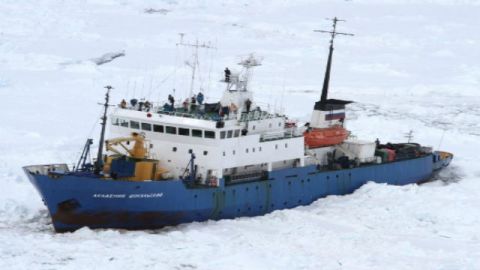If an icebreaker gets trapped in the ice and there are no journalists on board to report it, is it still news?

You know that old philosophical question; If a tree falls in the forest and no one hears it, did it fall? Here’s a variation; If a tree falls in the forest and a lot of people hear it, and they tell us they heard it, we know it fell, but…so what.
The falling tree metaphor matches up well with something in the news lately, a story that raises a larger issue about how the news media do, or don’t, tell us about what’s going on in the world, and the challenge we face of trying to stay informed enough to make healthy intelligent choices.
For several days there has been steady coverage of an icebreaker, the Akademik Shokalskiy, stranded in thick Antarctic ice. Big deal. Ice breakers get trapped in the ice all the time, in oceans and rivers and lakes in cold places all around the world, and we never hear about them…trees in the forest falling with no one around to hear.
But a few dozen journalists were on board this ship, covering a mission to follow the steps of an exploration of East Antarctica 100 years ago. So when this tree fell – er, I mean, icebreaker got stuck – there were lots of people around to tell us about it. Even though…well…so what? The stranded journalists filed reports about their adventure because that’s what they were being paid to do, but aside from the fact that they got stuck there wasn’t much to tell. They were never in any danger. They were safely helicoptered to another ship that will take them home. End of story. And not much of a story at that.
But this was all happening during the relatively slow news period of the end-of-the-year holidays, when editors are eager for anything out of the ordinary with which to fill up their newspapers and newscasts and websites. And so the world got to know all about the Plight of the The Akademik Shokalskiy.
This may seem a trifling matter, but it speaks to something far more profound. It’s about what is news, and who decides, and how, and the risk we face when the news media we count on to keep us informed, don’t.
What the gatekeepers in the news media decide is or isn’t news is a complex business. To the owners and editors, news is whatever might attract attention, and generate profits. (It is, after all, a business.) ‘News’ means something different to local TV stations than it does to national newspapers, than it does to public radio. It depends on whether there is a lot going on, or not much. It even depends on the personal interests of the editors. A TV news manager I know once decided her newsroom would not cover a story on the difficulty of finding daycare for working mothers. She was 25, and had no kids.
Reporters are gatekeepers too, deciding which facts to include and which ones to omit, and which ones to emphasize and which ones to bury. In stories about a risk, the riskiness gets played up and anything that softens the danger gets played down, or left out. Even the best reporters struggle to keep their subjective biases from interfering with honest objective journalism. Most reporters aren’t experts in any given area, so they merely echo and reinforce commonly accepted beliefs, even those that fly in the face of the evidence. That’s why there are still stories about how vaccines may cause autism (they don’t), that there is still debate about whether anthropogenic climate change is real (some details are still unclear but the scientific ‘debate’ is long since over), or that nuclear radiation causes genetic damage and high rates of cancer (it doesn’t).
Those of a certain age will recall Walter Cronkite signing off the CBS Evening news with “And that’s the way it is on (fill in the date.)” The problem is, there is a really big difference between The Way It Actually Is, and the Way the News Media Tell Us It Is. If we want to have a more complete understanding of the way it really is out there beyond our own lives, so we can be informed enough to make healthy choices for ourselves and our communities, it’s OUR job, not the media’s, to close that gap. Unless we’re willing to live on an information diet of meaningless stranded icebreakers, celebrity gossip, alarmist news about crime and terrorism and environmental risks, and coverage of government that focuses on the noise of politics rather than the substance of policy, then we need to vote with our time and attention, and money, for the news providers that give us more news than noise.
There are plenty of those sources out there, easy to recognize, doing a better job of providing information that’s relevant, useful, interesting (OK, I admit, an icebreaker trapped in the ice is interesting…), and as honest and fair to the truth as journalists can possibly manage to be. Find them. Support them, now, as the diverse New Media are blossoming to replace the centralized old Mass Media, but struggling to figure out how to make money at it. Otherwise our ignorance will be our own fault, not the media’s, and we’ll know mostly about the falling trees that don’t matter, but nothing about the ones that are about to land on us.




